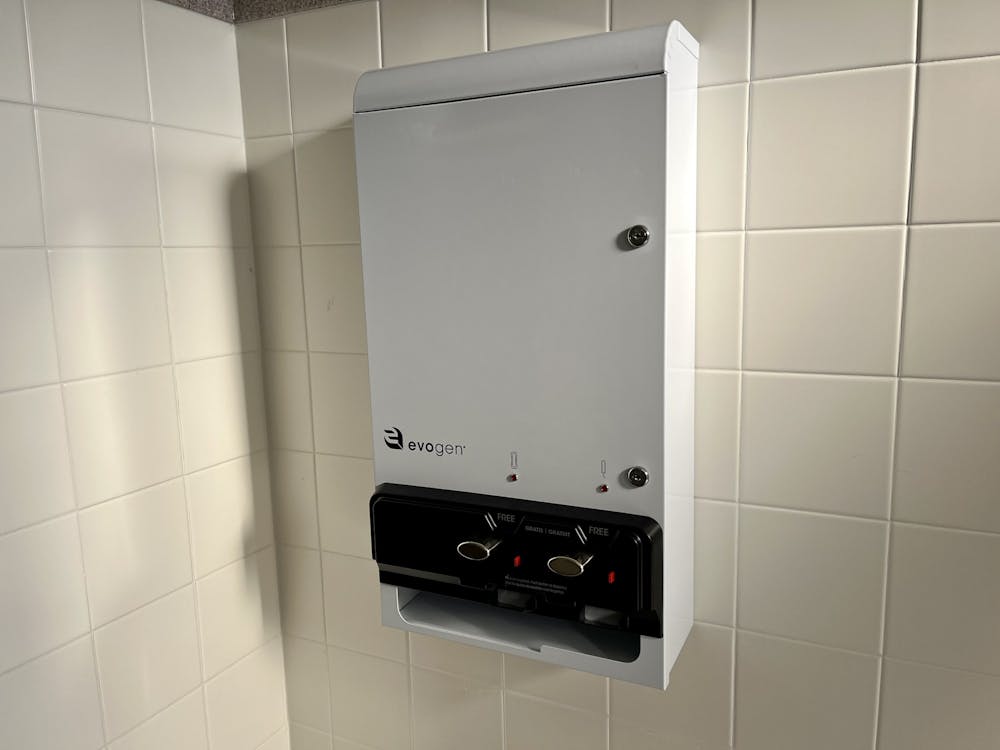American University is installing over 330 period product dispensers in order to comply with a new D.C. law. This action responds to the Expanding Student Access to Period Products Emergency Act of 2022, which mandates the installation and maintenance of period product dispensers in D.C. universities and the development and implementation of menstrual education beginning in the fourth grade.
Tamara Quinlan, a sophomore in the School of International Service and the School of Communication, was pleasantly surprised by the dispensers. Quinlan said she thought they were easy to use and a great improvement to student health on campus.
“I’ve always thought they were a necessary addition,” Quinlan said.
She also said that in the future, a wider variety of sizes for the products would make the dispensers helpful for more students. Quinlan also referenced the recent installation of vending machines with emergency contraception pills at George Washington University and said making contraceptives more accessible on campus is an important next step. But, for now, she thinks the dispensers are a good start.
The new law, passed by the D.C. Council, requires all universities, colleges and vocational schools in the district to install at least one dispenser for period products in every women's and gender-neutral bathroom and to keep the dispensers sufficiently stocked at all times. The act also requires the period products to be free of charge.
In a student media briefing on Feb. 10, AU officials emphasized the care that went into choosing the dispensers and planning for the installation, which must be completed by March 14 to be in compliance with the law. Bronté Burleigh-Jones, AU’s chief financial officer and treasurer, emphasized the importance of not just reacting to legislation, but also making considerate decisions that will best benefit the community, especially in relation to health safety.
“It doesn’t get a whole lot more personal than this,” Burleigh-Jones said.
According to the University, D.C. is the first place in the U.S. to pass this law, so the dispensers were not readily available to the scale demanded and had to be ordered six months ago to meet the deadline. AU currently estimates it has a six-month supply of period products and will evaluate usage to determine how often to restock their storage.
The University chose Evogen dispensers based on a variety of factors, including design, product type and security, according to Burleigh-Jones.
The dispensers will be checked and restocked daily by housekeeping, according to Vincent Harkins, the assistant vice president of facilities management. Any product that fits the dispenser can be used, so the University can choose sustainable products and have flexibility in the future to change the product supplier if necessary.
Ashley Jones, a sophomore in the School of Public Affairs and the president of the Residence Hall Association, represented AU residents in the decision-making process. When presented with the pros and cons of each dispenser, RHA representatives were able to give input based on their constituencies.
“[The administrators are] always so interested in getting student feedback, and they’re very receptive to that feedback in all the times that I’ve worked with them,” Jones said. “When it comes to the future of these products and the dispensers, I’m sure that they’re going to be incredibly receptive to that feedback.”
This article was edited by Abigail Pritchard, Jordan Young and Nina Heller. Copy editing done by Isabelle Kravis, Leta Lattin, Luna Jinks, Sarah Clayton and Stella Guzik.





